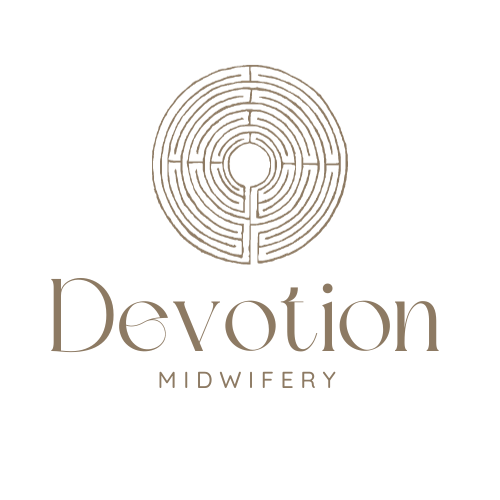
Meet Your Midwife
Leila Poland Wyatt
CPM, LM, BSM, CLC, CD
“Her knowledge, intensity, love, education, and encouragement for birthing women is absolutely incredible”
About Devotion
History
A Louisiana native, Leila was born at home in Lacombe with midwives, and grew up around the normalcy of birth as an every day occurrence. Leila birthed both of her babies in a birth center in Florida and describes her births as “orgasmic and life changing”. After becoming a doula, spinning babies parent educator, lactation counselor, birthing from within mentor, prenatal yoga teacher, and midwife assistant, it was clear that Midwifery was her calling.
Philosophy
“I believe in autonomy for both the midwife and the birthing families, and support licensed midwifery with full scope care, traditional midwifery, and attendants rooted in a lineage of cultural tradition, freebirth, and medical birth as desired. I believe in sovereign birth. I believe birth is a natural, normal event, that when respected, feared, and understood, rarely needs medical help but maintain skill and tools to do so and will not hesitate when needed.
I believe in anti-racism, inclusivity, and freedom.
My philosophy of care is deeply rooted in these beliefs and will hold them on the highest of esteem in every part of care that I offer.”
Leila considers her spirituality to be nestled in duality, a christian and highly aware of the nuances of spirit, soul, and energy.
Midwifery is an honorable role of service, protection, and devotion with the weight of wisdom, patience, and sacrifice, as a sherpa for matrescence. Midwifery work is activism.
Evidence
Devotion Midwifery is an evidence based midwifery practice. What this means is that we value individual preferences, research, and professional experience as the perfect recipe for guiding principles of decision making.
Another cornerstone of our care is informed choice. Every step of the way we will be delivering options and choices and it is important that you have all of the information to make a solid choice. We fully support and respect your decisions, knowing that you are the best and final expert on your body and your baby.
We are continuously keeping up to date on evidence based research while maintaining perspective and remaining humble. Although we help guide your journey, you are in charge.
Skill
Leila took her education seriously and became a traveling student midwife in order to experience a wide variety of clinical sites, communities, and philosophies. This allowed her to become a well rounded, culturally respectful, and skilled provider. Leila has attended over 500+ births, and is skilled at twins, breech, VBAC, waterbirth, and birth in every type of environment.
Leila graduated with a Bachelors of Science in Midwifery from Midwives College of Utah and is a Certified Professional Midwife through the North American Registry of Midwives. She is licensed in Louisiana. Mississippi currently does not have a licensing credential and recognizes Leila’s credentials as a midwife.
Leila maintains credentials as a neonatal resuscitation provider, CPR, Breech without Boarder trained provider, and completes yearly continuing education to always develop skills and competency.
As a NARM preceptor she plans to continue to develop more midwives for Louisiana.
Spirit
Louisiana is currently listed as the worst state in the nation for maternal mortality, neonatal mortality, cesarean sections, VBACs, STDs, poverty, and women’s rights. Even more, while these statistics seem like the biggest hurdle, there are only a handful of licensed practicing midwives in the state. Blatant systemic racism and fear of midwifery has been present for decades. Current regulations stand to bar midwives from attending VBACs, using their full scope, and offering well person care.
In 2025, Leila has worked with other midwives to create the Louisiana Midwives Association, a NACPM chapter to aid legislative efforts for improving the midwifery law and rule to better serve the community, remove the obstetric risk assessment criteria, allow VBACs, and improve our drug formulary. Look forward to more from the LMA soon! Additionally, Leila’s focus on training more midwives allows for a louder voice for women and birthing people in Louisiana.
By 2030 Leila hopes to open a New Orleans Easy Access clinic to offer the midwifery model of care to every person every time. This is with the intent of caring for low socioeconomic communities, marginalized groups, and reducing poor obstetrical outcomes associated with the standard medical and pathological model of care for pregnancy and birth.









